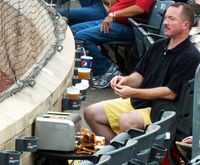Love to heckle? Toast? Or should we stop the jeering?

Rod Blackstone aka the “Toast Man” at Appalachian Power Park, where he sits behind home plate at West Virginia Power home games and heckles the opposing team’s players with a chant of “You Are Toast!” He then throws toast into the crowd. Photo courtesy of Wikimedia Commons.
Four years ago this month, OurValues began with one big goal: To show that Americans can have a civil discussion on even the hottest topics involving our most cherished values. So, we end our series on baseball this week (and complete four years) with … a Bronx Cheer?
Hardly! Of course, the Bronx Cheer isn’t a cheer at all. It’s really a sign of contempt, a raspberry for struggling teams. It’s also one of the time-honored and most beloved customs of baseball: razzing, booing, heckling. Along with the cost of a ticket, fans believe they buy the right to criticize loudly and vocally, both their own team and the visitors.
All part of baseball, right? And, of course, millions of Americans think it’s all part of politics—all part of public discourse everywhere we turn. Just a couple of days ago, a so-called journalist heckled President Obama during a speech about immigration reform.
Players do it, too. One of the older meanings of the term “chin music” describes the jawing heard on the diamond, often profane. Since World War II, chin music has become one of the terms for “a purpose pitch,” one thrown close to the batter’s face to keep him from crowding the plate.
There are at least a few people trying to promote civility in baseball. I wrote about a More-Than-Perfect Game earlier this week. Another option is: Try to turn the heckling toward humor.
West Virginia Public Broadcasting just reported on the 20th anniversary of “The Toast Man,” now firmly ensconced in minor-league baseball lore for actually making toast in the seats near home plate at a ball park in West Virginia. He tosses toast to other home-team fans as part of his heckling routine. He plays for laughs so effectively that the ball park management makes sure he has an outlet to plug in his toaster.
But, maybe it’s time to turn down the volume, and take a lesson from what many think of as the best baseball book of all time, Mark Harris’s "Bang the Drum Slowly." In the story, a slow-witted catcher is the butt of clubhouse mocking all season long. The team’s star pitcher, and the novel’s narrator, knows more than any of the players why it should stop.
“He was not a bad fellow, no worse than most and probably better than some, and not a bad ballplayer neither when they give him a chance, when they laid off him long enough,” he says at the end of the book. “From here on in I rag nobody.”
Where do you stand? Can't resist heckling?
Can heckling really be "good fun" for everyone?
What do you think about the proposal of just — laying off? Is it possible?
ABOUT TERRY GALLAGHER: Terry is the communications director of the Ecology Center of Ann Arbor. Terry worked for two decades in higher education before moving to the Ecology Center. He is an expert in using media to connect and strengthen diverse communities.

